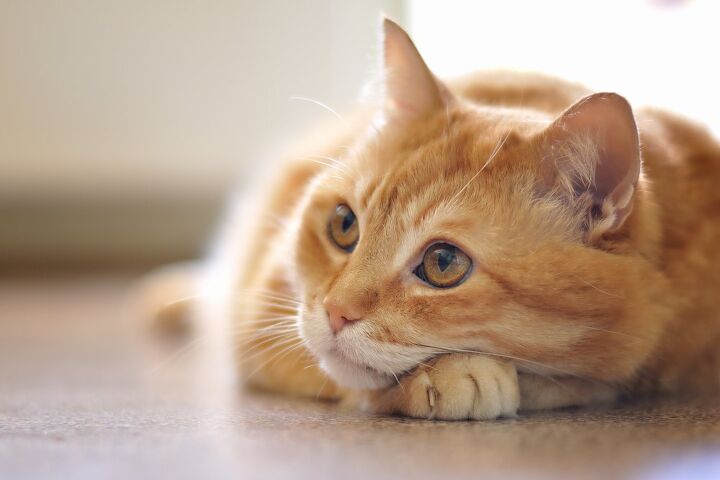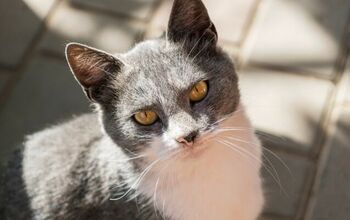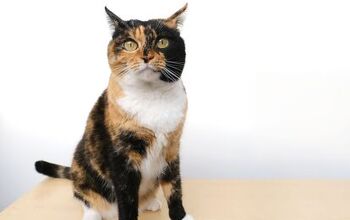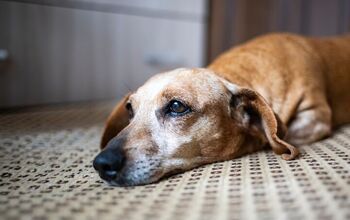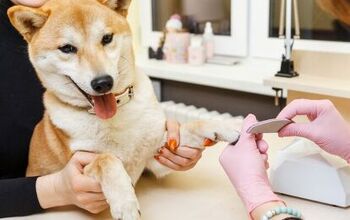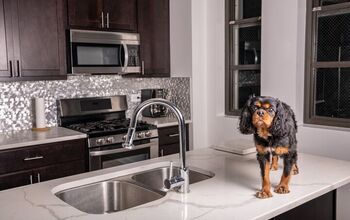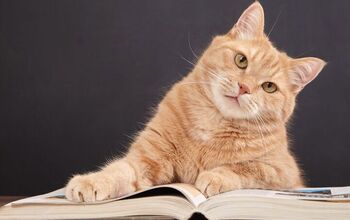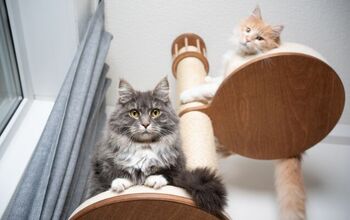Psyllium Fiber for Cats: A Natural Remedy for Constipation

Did you know that you can add fiber to your kitty’s diet? Let’s talk about psyllium fiber for cats and how it can help.
Taking a holistic or natural approach to your cat’s care is certainly possible. If your pet is dealing with constipation, for example, you might consider psyllium fiber as a potential remedy. But what is psyllium fiber, and how does it work? How should you use it in your cat’s diet, and are there any precautions that you need to take?
We’ve compiled some helpful information on psyllium fiber below to give you greater insight into what it’s used for and how it might be able to help kitties that have certain digestive issues.
Note: If you’re thinking about trying psyllium fiber, such as to help your pet have a bowel movement when constipated, we recommend consulting with your veterinarian first. Professional veterinary guidance can help ensure that you’ll choose the appropriate remedy at the right dose for your pet, especially if your feline friend is taking other supplements or medications or has been diagnosed with a medical condition.
Related: How To Naturally Treat Common Digestive Disorders In Cats
What Is Psyllium Fiber?
Psyllium fiber is a natural fiber from the plantago ovata plant, and it is a source of insoluble and soluble fiber. It is also the main ingredient that is used in the popular over-the-counter fiber supplement, Metamucil.
Insoluble fiber won’t dissolve in water, and it can add some bulk to your cat’s stool to help increase the speed at which it will move through your pet’s digestive system. Soluble fiber, on the other hand, will dissolve in water, so it will form a gel within the animal’s digestive tract, and it can encourage smoother movement. So, in other words, both of these types of fiber can help when it comes to maintaining healthy digestion and avoiding constipation.
Related: Can Your Cat Be A Vegetarian?
What Can Psyllium Fiber Do to Support Your Kitty’s Health?
There are a few things that psyllium can do to help your kitty feel better, particularly when it comes to your furry friend’s digestive system. Here are some of the reasons why it might be worth asking your veterinarian if your fur baby would benefit from psyllium fiber:
- Constipation: If your cat is experiencing difficulty with having bowel movements, you definitely want to have her checked by a veterinarian, as this is not a problem that should be ignored. Your vet can examine your kitty and evaluate her overall condition to work on figuring out what is to blame for the constipation. And your vet might recommend a supplement like psyllium fiber to help get things moving again if your kitty has been diagnosed with constipation. How could psyllium be useful in this situation? Put simply, this supplement may help increase the bulk of your cat’s stool, thereby stimulating movement in the intestines to get the stool out, and it may also help boost the water in your cat’s stool to make it easier to pass.
- Diarrhea: In addition to potentially helping your cat if she is constipated, psyllium fiber might also be a good natural remedy if she is experiencing diarrhea. Your veterinarian might recommend taking steps like fasting your kitty for a short amount of time before giving her small amounts of food to see if the diarrhea resolves. And you might also be told to try psyllium fiber, which can be added to a bland diet or to your pet’s usual food, to see if it helps your companion feel better sooner. Just remember that it’s important to ensure your kitty isn’t getting dehydrated if she’s dealing with diarrhea. And you always want to follow your vet’s instructions closely when tackling this problem and working on helping your cat feel better as soon as possible.
- Inflammatory Bowel Disease: This is a condition that can cause a variety of symptoms, and it’s really important to take steps to address this problem before it worsens, so don’t ignore it. If your cat has been diagnosed with inflammatory bowel disease (IBD), working closely with your vet is imperative, as you want to be sure you can give your kitty everything that she needs to feel better. Psyllium fiber might be recommended in this case because it may be helpful when tackling problems like diarrhea and constipation.
- Hairballs: Does your cat throw up hairballs often? Then you might be looking for a solution that can help reduce the frequency of those hairballs. Well, fiber may be worth trying, as it might support your kitty’s body in pushing the hair through the digestive tract and then out of the body through the stool. And if you want to add a little more fiber to your cat’s diet, psyllium might be the right choice.
The Importance of Water When Giving a Cat Psyllium Fiber
Whenever you give your cat psyllium fiber, it’s super important to also provide your pet with plenty of water. That’s because an obstruction might occur in the intestines if the psyllium fiber is ingested without adequate amounts of water.
If your kitty doesn’t seem interested in drinking water, you aren’t alone. Some cats won’t drink a lot of water from a bowl, which is why many pet parents turn to water fountains for cats. Basically, the running water might entice a kitty to drink more than a bowl of standing water would.
In addition to providing a bowl of fresh, clean water at all times, another strategy that may work well is to simply add some water to your companion’s wet food. Doing so can help ensure your cat is staying properly hydrated, so this may be the best way to go when trying psyllium fiber.
How Do You Give a Cat Psyllium Fiber?
Before giving your kitty psyllium fiber, it’s important to learn about the best and safest ways to go about doing so. That way, you can provide your pet with the benefits of this fiber, with the lowest risk of any possible side effects.
Also, we can’t stress this enough: even when it comes to something natural, it is always smart to talk to your veterinarian first, especially if your cat is on any medications or taking any supplements, or if your pet is on a special diet. And it is especially important to consult with a vet if your pet has been diagnosed with a medical condition that you are managing with or without medications.
Adding psyllium fiber to your cat’s food
As mentioned above, to help your kitty get more fiber to relieve her constipation, while also ensuring there is enough moisture when doing so, you can try adding psyllium powder to her wet food. This is easy to do, as you just have to add the appropriate amount of psyllium to the food, mix it in thoroughly, and then feed your cat as you normally do. Provided that your kitty doesn’t realize that you added the fiber, or doesn’t mind it even if she does notice, you should find that she eats her meal without any complaints.
Getting the dose right is also important. Contact your veterinarian to figure out how much psyllium fiber you should be adding to your cat’s food, and how often you should give her the psyllium fiber. The dose may depend on your cat’s condition and weight, and your veterinarian may tweak his or her recommendations based on how your kitty responds to this treatment.
Closely following your vet’s instructions regarding how much psyllium fiber to give, and how often to give it, can help ensure you get the best results possible. But it is also important to keep in mind that this remedy might not work immediately. For example, it might take upwards of 72 hours before you begin to see improvements in your kitty’s condition. Your vet can advise you on what signs to look for to figure out if the psyllium is working or if you should stop giving it to your pet.
Important Note: Although you might think of simply giving your cat some Metamucil, beware that this product may contain other ingredients, such as artificial sweeteners and flavors, that can be harmful to your cat. So, before you do, carefully read ingredients and talk to your vet to be sure it’s safe.
What about cat food or supplements with psyllium fiber in it?
If you come across any cat foods, treats, or supplements that contain psyllium, such as Vet's Best Chewable Tablets Hairball Control Supplement for Cats, remember to check all of the ingredients. And, again, it is a good idea to talk to your veterinarian before giving any to your pet, as you want to be sure it’s the right move.
Your veterinarian might even recommend certain fiber supplements that contain psyllium, and you would need to follow the instructions carefully for those products to be sure you give your cat the right amount.
Consider psyllium fiber a short-term solution
Experts note that psyllium fiber is often best used on a short-term basis. Including it in your pet’s diet long-term might cause it to lose its effectiveness. Your vet will be able to guide you when it comes to how and when to use psyllium fiber. And if your kitty is dealing with chronic constipation, know that there are also other strategies that you could implement to help restore and maintain digestive health.
Are There Any Precautions to Take?
Whenever you are thinking about adding a new supplement to your pet’s diet, even if it’s natural like psyllium fiber, it is wise to talk to your veterinarian first. That way, you can discuss your pet’s condition and determine if psyllium fiber is truly right for your companion. Also, as mentioned above, your veterinarian can give you instructions regarding dosage, and can advise on how long you should give your kitty this fiber to help improve her digestion. Plus, if your cat is being given psyllium to help with a digestive ailment like constipation, your veterinarian can help you track her progress, including if and how she’s improving with this fiber added to her diet.
Talking to your vet can also shed light on any precautions you should take when giving your cat psyllium fiber. But, to get a general idea of what to expect and what to look out for, keep reading.
Water is a priority. First off, as discussed earlier, it’s necessary that you provide psyllium fiber with your pet’s wet food, and ensure your cat is getting enough moisture from her food and clean water. Maintaining proper hydration is another way to help your kitty remain constipation-free. But, as mentioned above, you also want to make sure your cat is getting plenty of moisture throughout the day and night when you’re giving her psyllium because this can help you avoid problems like obstructions that may occur if the animal isn’t getting enough water. As you can see, the need for moisture when giving this fiber to your cat can’t be stressed enough.
Side effects are a possibility. Secondly, keep an eye out for side effects. When giving a cat psyllium fiber, side effects such as gas, stomach discomfort, or loose stools might occur. And it’s a good idea to ask your veterinarian about any other side effects that might develop as well. Be sure to contact your vet if vomiting occurs, if your pet has trouble having a bowel movement, or if she starts to have loose stools. Report all side effects to your veterinarian right away so you can figure out what steps to take to help your cat.
Psyllium fiber isn’t for all cats. Finally, it’s important to be aware that psyllium fiber isn’t always safe for a cat to take. For example, it shouldn’t be given if the kitty is suffering from fecal impaction. It might also interact with certain medications. Therefore, it’s best to ask your vet before giving your cat any psyllium fiber. And you might need to have your pet examined to determine the cause of the constipation or other digestive ailments before psyllium fiber is prescribed. Don’t just assume that psyllium fiber is the appropriate solution to your cat’s digestive issues. Instead, have your cat checked by a vet to get a diagnosis so you’ll know what’s really going on and causing her symptoms. Your vet can then recommend the treatments that are right for your pet based on her condition and needs.
The Bottom Line:
Psyllium might be just what your cat needs if she is experiencing digestive problems like constipation or diarrhea, and it might also be recommended by your veterinarian if your cat has been diagnosed with certain medical problems, such as irritable bowel disease. This fiber is quite easy to add to your pet’s diet. As long as it’s appropriate for your kitty, it might be the remedy that helps to get things moving in a healthy way again.
Just bear in mind that it’s better to be safe by working under the guidance of your vet, even when using a natural product like psyllium powder. Plus, your vet can direct you to the products that are best for your cat, as you might find foods, treats, and supplements that contain this ingredient too.
So, if you think psyllium might be right for your feline companion, talk it over with your veterinarian and use a high-quality product that will be effective in supporting your pet’s health in a natural way.

Lisa Selvaggio is a freelance writer and editor, and our resident cats-pert, with certifications in pet nutrition and pet first aid. She enjoys producing content that helps people understand animals better so they can give their pets a safe and happy home.
More by Lisa Selvaggio



